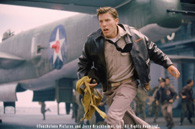
| Saturn Will Not Sleep - Discovery (Official Video) |

|
| home | movie reviews | features | sov horror | about | forum |
Pearl Harbor D+
Year Released: 2001
"That's a good idea, Homer, but they've already made some movies about World War II." I first saw the preview for Pearl Harbor while vacationing in Canada. The images were presumably supposed to stir our emotions. They didn't. The audience began giggling uncontrollably at the maudlin sentiments, the rampant jingoism, the self-important righteousness flashing across the screen. Any planned effect the filmmakers had was washed away in a wave of snickers. As the lone American, I had to repress the urge to slink out in the middle of it. There's nothing more humiliating than being laughed at by Nova Scotians. One would hope that the movie itself would do better than the preview, but no such luck. Pearl Harbor marries the ham-fisted storytelling techniques of producer Jerry Bruckheimer with the pretentious faux-history of screenwriter Randall Wallace without capitalizing on the flashy filmmaking that their earlier efforts thrived upon. A plodding, repetitive exercise in would-be importance, it reaches for the lofty heights of Saving Private Ryan, but can't even manage to deliver a decent summer action flick. Pearl Harbor's structure undoes it almost from the beginning. It sets out to demonstrate America's naïve isolationism that predated December 7, 1941, and the way the sneak attack transformed the country into unified crusaders. But it chooses to convey its message through an utterly uninteresting love triangle between two pilots (Ben Affleck, Josh Hartnett) and the pretty nurse they fall for (Kate Beckinsale). Affleck's Rafe MacCawley and Hartnett's Danny Walker are lifetime friends from Tennessee... and basically indistinguishable, despite some weak efforts at characterization. Rafe falls in love with Beckinsale's Evelyn but leaves her to go help England fight the Nazis (there was apparently a squad of American pilots over there for some reason), while the other two are shipped off to Hawaii. Then he's reported killed, and in the midst of their mourning, Evelyn and Danny tumble into each other's arms. But wait! It turns out that Rafe really wasn't killed after all -- he was recovering from injuries in occupied France -- and he shows up at Pearl just in time to complicate all their lives. Bet you're wondering how the Japanese figure into this. They don't, at least not for the first hour and half. Oh we get some secret plotting and a few nice scenes of Admiral Yamamoto (Mako) preparing the assault, but basically, we're supposed to watch this trio, marvel at how pure and innocent they are, and wonder how the upcoming horror will change them. The film focuses so much on their travails that the attack itself becomes little more than a sideshow to distract them... which would be acceptable if the love story were the least bit interesting. But the leads are so dull and their characters so two dimensional that you can't bring yourself to get involved. After 90 minutes of one-note foreshadowing and Beautiful People acting carefree and idealistic, you're actively rooting for the Japs to bomb the snot out of them. Even more irritating is that fact that Pearl Harbor insists on keeping its most interesting elements on the periphery. The details of the assault are sketchy and poorly presented, and the historical circumstances downplayed in favor of Affleck and Co. acting moony over each other. There are some potentially fascinating characters wandering through the action: Cuba Gooding's gritty ship's cook, Dan Ackroyd's suspicious Naval codebreaker, Jon Voight making a steely turn as Franklin Roosevelt. But Pearl Harbor can't be bothered to do much with them. Not when there's lost love to mourn. Action fans will presumably go for the attack itself, and here if nowhere else, the film develops some momentum. The effects-laden sequence runs some 45 minutes, and manages to convey some of the drama that the rest of the movie sorely lacks. Though the images bear a cynical similarity to Titanic, director Michael Bay knows how to pace an action scene, and the Japanese assault is rendered with taut effectiveness. He pays close attention to the details of the attack (for instance, the way the Japanese used wooden fins on their torpedoes to compensate for the shallow waters) without robbing the sequence of its drama. But that's 45 minutes out of three hours. The rest of the film is pretty much dead weight. Ironically, by devoting so much screen time to the romance, Pearl Harbor falls victim to the very naïveté it supposedly preaches against. A strong streak of infatuated naval gazing runs throughout the film, rendering the inevitable flag-waving all the more ridiculous. ("World War II changed America forever" a female voice-over cheerfully announces at one point; I'm given to understand that a couple of other countries were somewhat affected as well.) Certainly, the film is supposed to center on America's experience in the war, but when it includes such elements as the Battle of Britain and the occupation of China, it has to use them for more than complicating some Yankee's love life. Shallow, simplistic, and surprisingly long-winded, it does a tremendous disservice to the events it proposes to relate with such solemnity. Those Nova Scotians are probably still laughing. Judging by Pearl Harbor, I can't say as I blame them. Review published 05.28.2001.
|

|
| home | movie reviews | features | sov horror | about | forum |
| This site was previously at flipsidemovies.com from 2000 to 2008. |
|
contact | copyright | privacy | links | sitemap
Flipside Movie Emporium (FlipsideArchive.com)
|